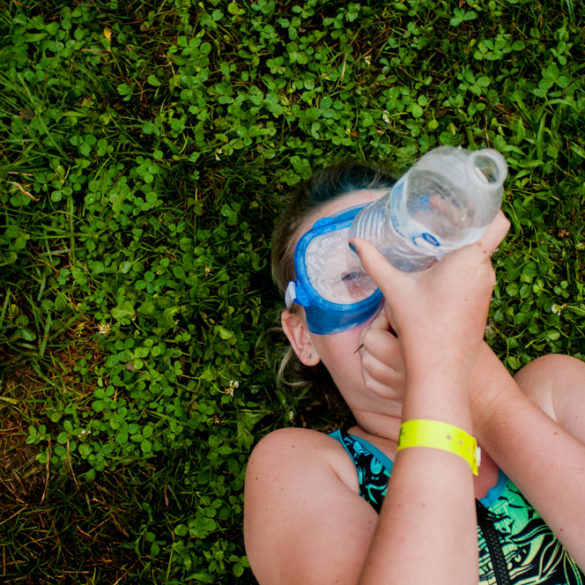Chance Osborne found her passion in working at Camp Kesem, a program to help children who have had a family member diagnosed with cancer.
Fifteen-year-old Chance Osborne didn’t expect her mother to be terminally diagnosed when she visited the doctor for stomach problems. But what started as a normal checkup soon turned into a CT scan that found Stage 4 ovarian cancer.
The family chose to forgo the drawn-out chemotherapy, but Chance still watched her mother go through what she described as “her own chemo.” Her bones grew weak, and her body grew thin. She couldn’t speak. She always had pain. She always felt tired.
And 92 days later, she died.
“My mom went to bed one night, and she didn’t wake up the next morning,” Chance says.
Chance shared a close bond with her mother. She’ll never forget gardening or watching America’s Funniest Home Videos with her.
“More than anything, we loved to laugh together,” Chance says.
And she’ll never forget what it felt like to lose her mom.
“I was incredibly frustrated,” Chance says. “I didn’t understand, and I wanted to understand.”
That’s why she’s been involved with Camp Kesem—a camp for children with cancer-afflicted loved ones—for three years. Chance, now a senior at Ball State University, wants to provide opportunities she didn’t have.
“I couldn’t process it on my own,” Chance says. “When I joined Kesem my sophomore year, I think that’s what saved me.”
Camp Kesem is a free, week-long trip for children ages 6 through 18 who have had a family member experience cancer. The camp got its start at Stanford University in 2000, but Ball State’s chapter began in 2015. According to outreach coordinator Mary Blanke, they started with 19 children the first year, and attendance has grown every year, with 65 at the most recent camp.
Volunteers applying to be counselors must be Ball State undergraduate students. Applicants go through a screening and interview process, as well as a training program. Co-director Evan Harvey says the counselors go through at least 30 hours of instruction in-person and online.
In the past, Chance has served as a volunteer and a volunteer coordinator, working directly with the children who attend the camp. This year, she’s contributed to Camp Kesem as a marketing and public relations coordinator, working with alumni and managing social media. While she misses the closer interaction with the Camp Kesem community she had in past years, she says the position has given her the chance to connect with the program in a new way.
In February, the development team sold ‘potatograms’ for $3 a spud. On Valentine’s Day, Camp Kesem counselors delivered potatoes with handwritten notes to doorsteps around Ball State’s campus. They plan to host a 5k run every fall and a basketball tournament every spring. They held a wallyball tournament with the Dance Marathon group in February, as well, Blanke says.
The Ball State chapter’s camp session runs from June 30 to July 5 at Flat Rock River YMCA Camp in St. Paul, Indiana. While at Flat Rock, counselors and campers play games and do other activities. In the past, Blanke has planned games for the ‘Messy Olympics,’ a Kesem tradition that has included everything from a paint war to Duck, Duck, Goose with raw eggs.
“I’ve been telling parents it’s everything you would not do at home,” Blanke says.
They also plan an evening called “empowerment,” in which campers and counselors gather in a circle and pass a microphone around to share their personal stories involving cancer. Some are only listeners, Harvey says, but they pour out their support to those who do speak.
“That feeling of family is more evident [that night] than it is the entire week,” Harvey says.
Camp Kesem is designed for kids to have a place to escape the stresses they might be experiencing at home. Harvey explained not all children have access to the help they need to get through having a family member with cancer.
“When someone is sick, everyone focuses on the person that’s sick, and rightfully so,” Harvey says. “But it’s the kids that get overlooked, and no one really pays attention to their feelings.”
As a counselor who has lost a parent to cancer, Chance can understand what others in her situation might feel like. Most counselors at Ball State have not lived through that experience, and Chance is thankful.
“I’ve got a really good balance of people who can understand because they’ve been through it and people who can empathize because they haven’t,” Chance explains. She says it’s like they are “walking alongside me in my grief.”
Chance’s mother isn’t the only one in her family who has been diagnosed with cancer. Chance’s grandmother and both her aunts have also been diagnosed. Chance herself tested positive on a BRCA gene test, meaning she has an increased chance of developing breast or ovarian cancer.
But she isn’t worried, and she says she’s proactive about getting scans, tests, and blood work throughout the year.
“My mom didn’t take any preventative measures,” Chance says. “She never got the tests she should have at that age. Probably would have caught it sooner.”
For anyone who has lost a loved one to cancer, Chance says not to rush the grieving process.
“Feel what you feel in its entirety,” she says. “Feel it out loud, feel it alone, feel it with friends, with camp, with your counselors, with a therapist, with your surviving parent, with your siblings—just feel…No one is in charge of [your] grieving process but [you].”




